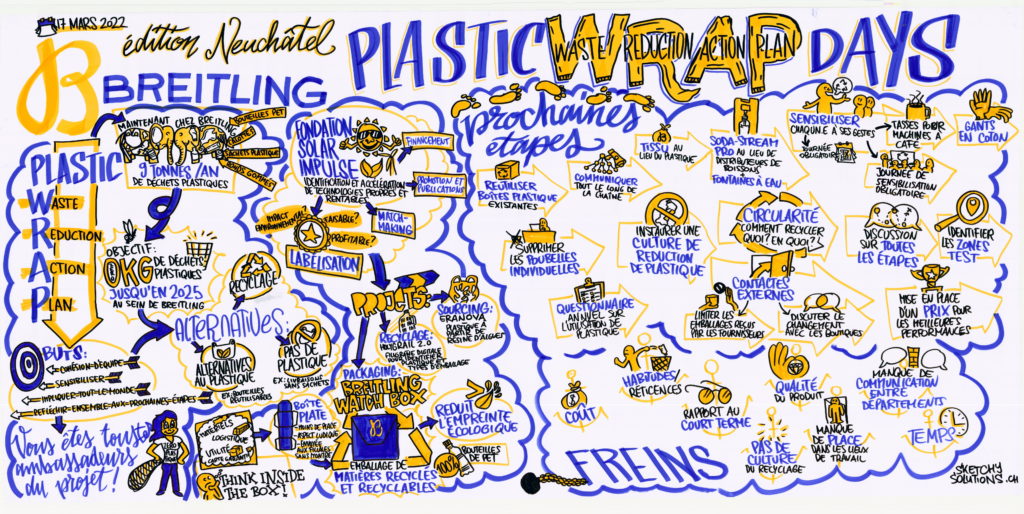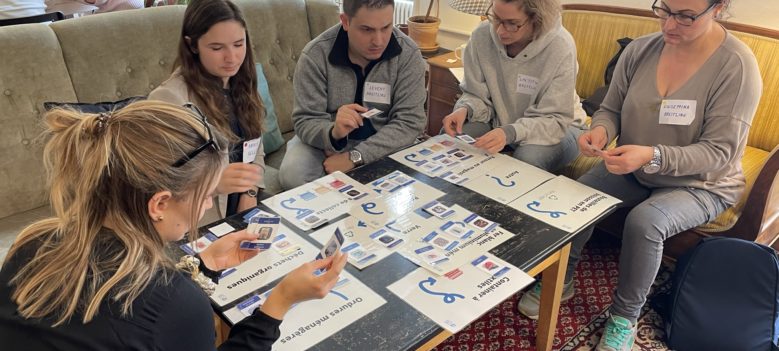Intro
What is collective intelligence and how can it help a company shape its sustainability strategy? This article is the story of how Breitling chose to use collective intelligence as a tool to amplify their Plastic Waste Reduction Action Plan (Plastic WRAP) with the help of their employees, key stakeholders, collaboratio helvetica and Let’s Talk Waste.
The story
We met Aurelia Figueroa, the Head of Sustainability at Breitling, in March 2021 with the intention of building a collaboration between Breitling, collaboratio helvetica and Let’s Talk Waste. Breitling was initiating an action plan to reduce plastic waste in the company and in their production lines. The company was seeking ways to amplify and support their efforts through the knowledge and experience of both collaboratio helvetica and Let’s Talk Waste in the emerging field of systemic change. We quickly identified a way to put our expertise and skills to good use for Breitling: we offered to create a full-day experience with employees and key stakeholders to raise awareness on the topic of plastic pollution and to involve the participants in the development of the Plastic WRAP.
On March 17th, 2022, this collaboration spawned its first success by engaging 30 participants for a full day immersion into the topic of plastic waste. It took place in Neuchâtel at the coworking space hub neuchatel and it was deliciously catered with a plant-based menu and waste free services by Wishbone Eatery.
The day was organised in two main parts: firstly, sharing detailed information on the topic at hand, in this case plastic waste, through an interactive and educational workshop; secondly, jumping to action by exchanging ideas and insights pertaining to how participants could contribute to further strengthening the Plastic WRAP.
The educational workshop guided participants through an awareness journey with the two famous Let’s Talk Waste games. The participants learned about the impact of waste in nature and about proper recycling practices in Switzerland. They also discovered that recycling may not always be the perfect solution we think it is and found out that there are other actions they could consider doing in their private lives and at work to reduce their waste footprint.
In the afternoon, Breitling offered key inputs on the ongoing efforts to reduce plastic waste and the success achieved so far. We then invited the participants to have a generative dialogue about how the Plastic WRAP should develop in the future. This is where collective intelligence came into play.
The 1-2-4-all dialogue method
Collective intelligence can be tapped into in many ways. The way we choose for Breitling is the 1-2-4-all dialogue method. This method consists in first allowing time for self-reflection on a question or topic before going into an exchange in pairs, then in groups of 4. At the end of the dialogue, the essence of the discussions is harvested in plenum. This approach offers several benefits. First, it enables each participant to listen to themself from the outset, without being influenced by louder voices. In doing so, they can forge their own unique opinion and dig deeper to see what reactions are triggered, what may be a point of leverage or strong posture. These thoughts are then shared in a duo, allowing for cross-pollination by other perspectives. These new elements are in turn brought to a group discussion, enriched and summarised. During the plenum sharing, it becomes clear that the results of the reflections and discussions are representative of all the voices, not only the louder ones. And most importantly, the outcomes reflect much deeper insights from the collective’s mind than the standard brainstorming approach. Learn more about this method here.
How was it for Breitling
For Breitling’s dialogue, we tailored the questions around the Plastic WRAP and invited the participants to reflect on how they felt about the strategy. For example, if they saw or already experienced any challenges to its support and implementation, and how they would see it develop in the future. In the collective sharing at the end, it was precious to see how authentically the participants shared and learned from each other what might be needed for the Plastic WRAP to grow into something more powerful than it already is, from increased ownership to better information flows. The biggest highlight for us was that there was a strong agreement that cross-department collaboration is key to continue working towards zero plastic waste by 2025 across all operations.
The dialogue was recorded by a graphic recorder, Sketchy Solutions and here is the outcome.

Conclusion
Collective intelligence once again proved more powerful and fruitful than the sum of many and we believe that Breitling will be able to take the learnings and conclusions of the day to strengthen their work towards zero plastic waste.
Let’s Talk Waste and collaboratio helvetica would like to thank Breitling, Aurelia Figueroa and Brice Boissonneault for their leap of faith in us and our approach, and look forward to the continued collaboration.
About the authors
Julia Bodin is an environmental engineer and a changemaker. She founded Let’s Talk Waste in 2018 with no small mission : to cut plastic pollution at its root for a plastic-free Switzerland. She was a Catalyst on the 2020-2021 edition and is looking to create spaces for dialogues about regenerative economy in Switzerland inviting all decision makers of the regenerative economy transition to the table and guiding them on a Social Innovation Lab Journey. Find out more about the initiative here.
Erica Mazerolle is a facilitator, a social innovator and a circular economy entrepreneur. Geographer by training and educator by trade, she is passionate about using participatory methods to raise awareness, drive engagement and bring transformation towards sustainable consumption and production models. Find out more about her projects here.

